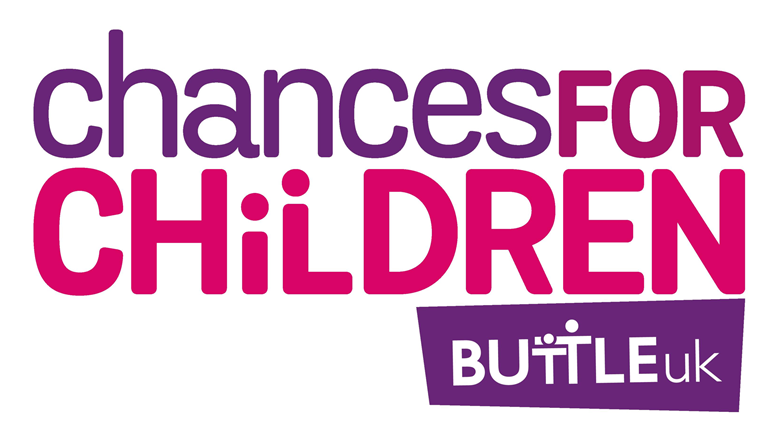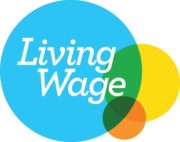How the Cost-of-Living Crisis is Impacting Those Already in Poverty The Most
The Cost-of-Living Crisis is having a massive impact on many families across the UK. The End Child Poverty coalition stand up for children in poverty every single day. In this blog, we explore the impact that the Cost-of-Living crisis is really having.
All the organisations in the End Child Poverty coalition stand up for children in poverty every single day, and we ask no less of the government. The coalition exists to hold the Government, and all main political parties, to account on this issue.
Today, just under 80 organisations are members, including: local and national charities, faith groups, and unions
When it comes to Child poverty in the UK there are so many stark statistics to mention, our State of Child Poverty report highlights some of these key facts and statistics.
This report from the Nuffield Foundation highlights very clearly that ‘family poverty and inequality are key drivers of harm to children’.
Key points of note in the report are that it states:
- ‘The economic conditions of family life alone – without any other factors – impact on rates of abuse and neglect.
- It adds that, increases in income in the family home reduced rates significantly.
- That, the impact of poverty in many studies was substantial, not marginal.
- And that, economic shocks increased abuse and neglect except when families were protected by welfare benefits.
This is all very clear and yet we fear levels of child poverty will dramatically rise this year as the cost-of-living increases continue, alongside government inaction in this area.
We know that child poverty is not inevitable. We have seen during Covid that with state intervention, via the benefit system, child poverty levels can be reduced. An estimated 400,000 children were pulled out of poverty last year when Universal Credit was increased by £20 per week.
This strengthened the safety net, which should be there to catch any of us when we need it most. But the Government’s decision to cut Universal Credit last October is likely to have pushed those children back into poverty.
There is likely a three-fold increase of factors concerning poverty to come:
- The numbers living in poverty
- The depth of poverty for those experiencing it – The report highlights that: ‘Deep poverty, growing rapidly in the UK in recent years, and persistent poverty are more damaging for children’s safety and development than a low income or temporary difficulties.’
- The duration spent in poverty – The report highlights studies that show that a ‘longer duration in poverty has a detrimental effect on the likelihood of child abuse and neglect’.
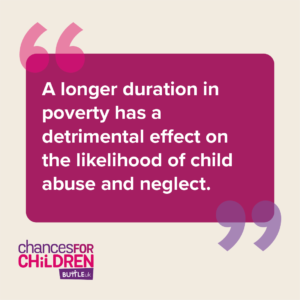
And in this cost-of-living crisis, unless there is significant change from policymakers, we are likely to see all three of these increase.
It’s hard hitting and the situation is pretty stark for children.
Whilst the Government reports on levels of child poverty, as it has done recently in March, it has no legal obligation to reduce these figures. Currently, there is no child poverty focussed strategy to do this either. A policy that the End Child Poverty Coalition have called for over recent years.
So, what are the opportunities for political influence using this research?
Simply – it provides additional evidence that is so important when pushing policy-makers for change. It can be used not just for politicians, but to focus the public eye on the harm poverty causes as well.
When we speak to policy-makers, we absolutely need a robust evidence base concerning the effect of poverty on child protection and raise public awareness of this too, in order to galvanise the Government to take action.
The report has clear connections to the existing policy changes that the End Child Poverty coalition is calling for – these include practical recommendations to be taken by governments across the UK to reduce levels of child poverty. Specifically:
- investing in our social security system and social housing,
- to the provision of free school meals for all children on Universal Credit
- and funding for schools to bridge the attainment gap.
Here is an example using just one of our broad policy positions particularly connected to the report and is supported by the evidence it provides:
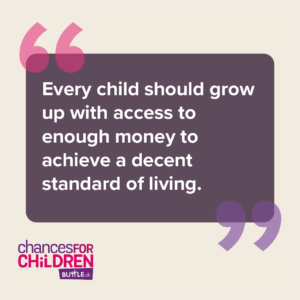
Every child should grow up with access to enough money to achieve a decent standard of living.
For example:
- The government must address benefit levels so families receive the support they need and can always afford the essentials.
- A family-focused strategy to support parents who are able to work must be developed
- The Government must ensure locally managed funds are available to help families in crisis.
- And further financial support should also be provided to families who are caring for a disabled child
Much like the researchers in the report, we see poverty levels as relating to a broken system.
The current benefits system is not fit for purpose, and needs to be overhauled to ensure it is working for the benefit of those who need it the most.
Additional provision from government through Universal Credit helped to reduce the numbers of children in poverty, and this report also highlights studies that provide specific evidence of the protective effects of additional income in the form of welfare benefits.
For so long, people living in poverty have often been blamed for their own situation and the decisions they have taken. There is a risk that research like this can be miscommunicated by some, to further perpetuate that stereotype. So we have to ensure that these results are not misinterpreted in this way, and the blame on families, or that it is suggested that people living in poverty are more likely to harm their families.
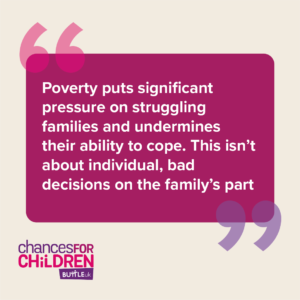
Poverty puts significant pressure on struggling families and undermines their ability to cope. This is not about individual, bad decisions on the family’s part.
Poverty is corrosive, and financial support for families is not stepping up to address this right now, it is losing its value instead. And this is turning up the pressure on so many more families.
This report supports this framing, particularly regarding the challenges families face with the depth of poverty they experience and the duration they remain in it. It also highlights the challenges of stigma and shame that can make things so much worse for families.
I think it is also worth highlighting from the report that, as yet, almost no research has studied ‘better off’ families, although in England a significant number of abuse and neglect cases come from these families. More research is clearly needed here.
The use of language is also important when pushing for policy change. One of the report recommendations to reduce harm is to create national ‘levelling up’ policies that cut family poverty. Although the Government’s Levelling Up agenda makes no mention of poverty (let alone child poverty), we need to use the Government’s own language when making our case for change.
The report provides specific evidence of the ‘protective effects of additional income in the form of welfare benefits.’ By ‘levelling up’ and investing to help poor families, through higher benefits for example, we can prevent the need for larger and more costly interventions later on.
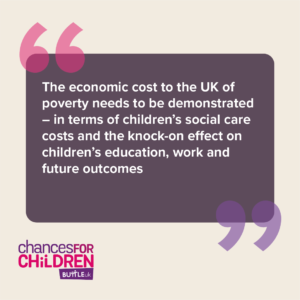
The economic cost to the UK of poverty needs to be demonstrated – in terms of children’s social care costs and the knock-on effect on children’s education, work and future outcomes.
Growing up poor means being more likely to:
- have a range of physical and mental health problems,
- be excluded from school,
- and be taken into care.
As well as the human cost, there is a financial cost to the Treasury of billions through greater additional spending on public services. So there needs to be provided costed recommendations to government to reduce child poverty, but evidence from this research can support the case for change.
Finally, there are a couple of additional themes that came out of the report and that are relevant in the policy arena as well as the research field too and further afield.
The first is the lack of intersectional research into the ways in which poverty affects family life highlighted in the report. There is a huge gap in the evidence base here and something we would really urge to be developed. Poverty does not impact all families equally. If you are a woman, a person of colour, and are disabled or have a disabled child, you are far more likely to experience poverty.
Secondly, the report calls for more research that is co-produced with those that have experience of poverty and the need to hear the voices of those whose lives are mentioned in this research. This is something we have begun to do in our work with children and young people at Buttle UK. This kind of evidence based, co-produced research will pack a real punch, producing evidence that is more than statistics, and empowers those living in poverty to shape their own future.
